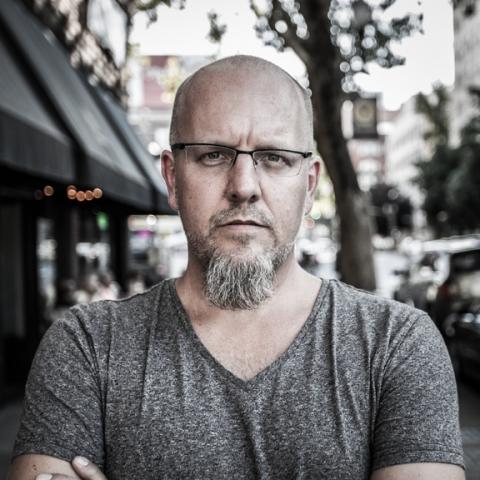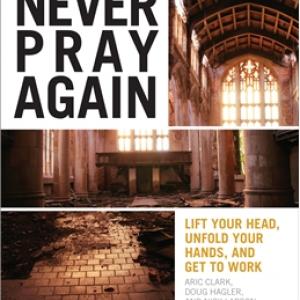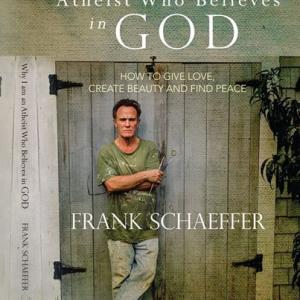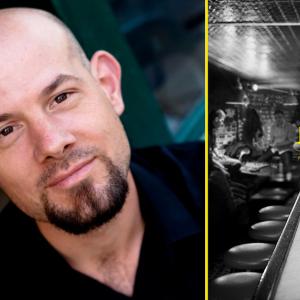
Christian Piatt is an author, blogger at Patheos and founder/cohost of the Homebrewed CultureCast podcast, where he focuses on the intersection of faith and popular culture. His latest book, “Leaving A-holiness Behind,” is available now, and his next book, “Surviving the Bible: A Devotional for the Church Year 2018,” will be available November 1, 2017.
Posts By This Author
Fence-Sitters and Boundary-Pushers: A Postmodern Reflection
The modern era is marked by a tendency to worship such fences, such rules, institutions, doctrines and traditions, simply because they already exist. And oftentimes, the very things we are preserving are products of those with privilege and power—so in sustaining, or even not actively challenging, such systems, we’re actually contributing to the holding-back of those with less of a voice.
The Holy Common Ground of Wild Goose
We’re headed home from Wild Goose Festival, a gathering of artists, activists, musicians, and theologians, in Hot Springs, N.C. It was hot, rainy, and messy. My suitcase smells like my fifth grade gym locker.
I can’t wait to go back next year.
The speakers are remarkable; many of them are walking the talk they’re offering, which is an unfortunately rare phenomenon. The music is fresh and exciting, the art is created before your eyes, and there is an energy of hopeful expectation that renews your soul, flushing out the broken-down-ness of daily life.
But the most important part of the whole four-day event lies in the unexpected moments. Sometimes I would walk along the main dirt road in the middle of the grounds, lined with tables, tents, and makeshift gathering spaces, until I saw something interesting going on and just joined in.
In one moment you’re debating the theological implications of the American food-industrial complex. Half an hour later, you’re laughing with new friends in the beer tent. And then, just when the sun sets and you’re sure you lack the fortitude to go one any more, the music on the main stage cranks up and the very earth beneath you vibrates.
Engaging a Generation for Justice
One of the most gaping absences in church community often is a point of entry or transition for young adults. We do great with kids, and of course most congregations pant after the coveted “parents with kids” demographic. But what about after high school? How do we serve young adults as they transition to independence for the first time? How do we help them navigate the complexities of adult life, while helping forge in them a sense of character and mission informed by the Christian faith?
One organization taking on these difficult challenges in real, transformative ways is Mission Year. I sat down with Shawn Casselberry, Executive Director of Mission Year, to find out more about how they empower young adults to live out their values in the context of church, community, and even daily life.
GO: The Biggest Word in the Great Commission
Our son, Mattias, is a complicated kid. He’s sweet, creative and remarkably intelligent. But to say he is strong willed would be underselling his capacity for intransigence.
When he was in preschool he, like many kids, went through a “naked phase.” He never wanted to have his clothes on at home (which was no small issue with regard to our furniture’s upkeep), and getting him dressed in the morning was part chore and part all-out war.
“We have one of these kids every year,” said his teacher, a seasoned veteran. “What you have to do is call his bluff.”
Sacrament as Subversion
Anyone who thinks much on theology will tell you that you go through patterns of thought. For a long time, I was intrigued — and still am in many ways — by the notion of Jesus as a “third way” prophet, offering something different than both church and secular culture most of the time. As I learned of different interpretations of the crucifixion, I became obsessed with nonviolent activism, and the idea of responding to force or bloodshed with something else entirely.
Now, my latest mental track is sacrament. I am interested in what makes something a sacrament, yes, but also in the power connected to sacraments and what human beings do with that power.
I am part of the Christian Church (Disciples of Christ), a denomination that has Alexander Campbell as part of its roots. Campell was notorious for supposedly causing a stir in his local church around the sacrament of communion. At that time, the Church handed out tokens to those it deemed worthy to participate in communion. No token? No communion. So this one particular day, Campbell entered the church with his token in hand, but when they offered the elements to him, he refused, tossing the token on the ground and walking out. He went on to help start the Disciples based, in large part, on the concept of the open communion table.
What If You Never Prayed Again?
There’s a place in the cultural conversation for both friars and fools, for those who discern truth through contemplation and prayer, as well as those who seek to reveal it through satire and silliness. But it’s not every day that both come together for substantive (if not always serious) theological conversation.
Aric Clark, Nick Larson, and Doug Hagler, also known online as Two Friars and a Fool, host such conversations on their blog and podcast about theology and spiritual practice, sexuality, and popular culture. They recently combined forces as well for their first book, Never Pray Again: Lift Your Head, Unfold Your Hands and Get to Work. The intentionally provocative title emphasizes the need for Christians to get outside of our own heads and churches, and about the business of being the hands and feet of Jesus in a world in need.
I chatted with the trio recently about their new project, as well as the “Never Pray Again” coloring book, which they crowd funded through a recently successful Kickstarter campaign.
And God Said, 'Let There Be Darkness'
I’ve always had a curious sort of sympathy for the bad guys. I cried when King Kong died. I wept at Darth Vader’s demise. And I felt like the whole melting thing was a little bit harsh for the Wicked Witch of the West.
Maybe they didn’t really want to be bad. Maybe they were just written that way. Could be that they had a rough childhood, or people made fun of them for being green, or big and hairy, or breathing through a big, black mask. I mean, imagine that on the playground …
Ever since my childhood I’ve felt more comfortable in darkness than most kids seemed to as well. My 10-year-old son won’t even go into any unlit room in our house without being accompanied by our dog, Maggie. But I actually enjoyed being in the dark. It seemed like the one place where I could let the otherwise literal, concrete parts of my brain take a rest, and allow my imagination to run wild.
Theologically, we’re taught to hate, or at least fear, the darkness. We are children of light, God called light into being, and it was from this light that all things were formed. So what use do we have for darkness?
The God-Believing Atheist: A Q&A with Frank Schaeffer
One phrase comes to mind, time and again, when I think of Frank Schaeffer: “THINK AGAIN.” Any time I think I have a handle on things theological, he seems to find the thread, hanging from the edges, and gives it a good, solid yank.
Such is the case once again with his newest book, Why I am an Atheist Who Believes in God: How to give love, create beauty and find peace. Just when it seems the delineations between theism and atheism, between believers and nonbelievers, is sufficiently clear, Schaeffer blurs even those lines, leaving us to wonder what it is any of us actually believes and why.
Frank Schaeffer is not one to deconstruct theology (or even the lack thereof) with some kind of sadistic joy, leaving us to sort through the pieces. Rather he explores what I might call trans-theism, offering us practices, a vocabulary, and a worldview that take us far beyond belief toward a deeply human – and yet inexplicably transcendent – experience.
I asked Frank several questions about his new project; here is what he had to say.
'Daddy, why are those people sleeping in the park?'
MY 5-YEAR-OLD daughter, Zoe, is in preschool. This means, as most parents of school-age children know, that there is a birthday party to attend approximately every other weekend of the year.
On the way to one of these myriad celebrations, we stopped by the church in downtown Portland, Ore., where my wife, Amy, is the senior pastor. She had a daylong meeting, and we needed to switch cars, as hers was the one with the gift in it.
As we came down the front steps of the church and onto the South Park Blocks, a local city park, we saw at least half a dozen emergency vehicles parked in a haphazard formation along the street and on the sidewalk in front of a small public restroom. Several officers were standing together, making calls on their radios and discussing the situation at hand. At their feet was what appeared to be a lifeless body, lying on the pavement underneath a blue tarp.
“Daddy,” Zoe said, “what are those police mans doing in the park?”
“I’m not sure, honey,” I said, “but it looks like somebody needed their help.”
“Is somebody in trouble?”
“Something like that,” I sighed. “Make sure you don’t drag that gift bag on the ground. We don’t want to mess up your friend’s present before we get to the party.”
My first thought was, God, please don’t let it be Michael. Michael is a man about my age who lives outside and wrestles daily with an addiction to alcohol, among several other things. We have helped him get sober, only to see him relapse. We helped him get into supportive housing, only to watch him get into a fight and get thrown back out onto the street.
Sarah Palin’s Dying Breed of Christianity
Most people in their right minds consider Sarah Palin’s statement about using waterboarding to “baptize” terrorists as insensitive at the very least. It further reinforces the notion that she will say or do nearly anything to grab a headline, even if it is at the expense of her own integrity, and perhaps that of her political cohorts or even her faith.
She’d be doing all of us a favor if she’d simply stop talking publically. But in as much as she continues to be afforded a microphone and speaking pulpit, we get to bear witness to her attempts to improvise a caricature of herself on the fly.
Perhaps the most disturbing part of the statement to me is not the brazenness of it, or even the apparent lack of self-awareness or personal filter. It’s that she’s actually speaking on behalf of a significant – albeit shrinking – subset of Christian culture in the United States. It’s the strain that believes that the Prayer of Jabez (a prayer about expanding one’s spiritual territory) is a Manifest Destiny of sorts from Jesus to his followers. We’re to reach to all corners of the earth, emboldened with a “be assimilated or be eliminated” mentality at our backs.
Why I Feel Sorry for Donald Sterling
Donald Sterling, eccentric billionaire and owner – at least for the moment – of the Los Angeles Clippers basketball team, learned firsthand the weight of his own words on Tuesday. After allegedly being recorded making numerous racist remarks about African-Americans (both on his team and otherwise), the National Basketball Association handed him a lifetime suspension from association with his own team, along with a $2.5 million fine.
Though Sterling’s comments were highly inflammatory and distasteful, the NBA’s swift and severe consequences helps contain the damage, keeping the poison from infecting the league’s reputation any more than it already has. And good riddance to such attitudes, as they should find no audience in any public forum, let alone in a sport where a majority of the players are black.
Sterling’s consequence is not why I feel pity for him. He got what he deserved, and the stigma that goes with such shunning likely will weigh on his future business ventures. What saddens me for him is the sense I have of him as an individual, having read extensively about him online, and having listened to the audiotapes attributed to him.
The Supreme Court's Assault on Democracy
It started when the United States Supreme Court determined that corporations were people and, as such, had similar rights and protections as us oxygen-breathing types. And now, in another recent decision, the court has decided that people (individual human beings or corporations) have the right to donate to an unlimited number of political candidates — therefore removing the aggregate cap on total donation amounts — as such gifts should be protected as an exercising of free speech, as defined in the constitution.
So much for representative democracy.
It’s my understanding that the founders of our nation and the framers of our constitution held the notion of representative democracy fairly sacred.
Four Reasons Men Need Paternity Leave
New York Mets second baseman Daniel Murphy recently took some heat from a few peers of his in sports media for taking the first few games off of the new baseball season to be with his wife while she gave birth to their baby. In particular, former NFL quarterback Boomer Esiason said on the WFAN radio show that Murphy needed to “get his ass back to work,” and that Murphy's wife should have undergone a C-section before the beginning of the season so he would not miss any games.
This kind of language is insensitive enough, but it is especially shocking coming from Esiason, who is a father to a child with special needs himself. Boomer has since retracted his comments, apologizing not only for his insensitivity, but for dragging Daniel's personal life, and that of his wife, Tori, into the public conversation. But if anything good can come from this, it is that it has raised the issue of a father's role in the birth in the early months or years of his child's life.
The Dead Don’t Die; They Just Reboot
Religion has, for centuries, been fairly obsessed with the afterlife. For some, what awaits us after our physical death is fairly central to their faith. But thanks to the Internet, many of us end up having a sort of life after death, whether we intended to or not.
In a recent article published in the New Yorker magazine, Pia Farrenkopf experienced the sort of digital life after death that some might find appealing, while others would consider it rather horrifying. Pia traveled frequently for work, so it was not unusual for her neighbors not to see her for long stretches at a time. They would mow her lawn when the grass got long and kept an eye on the place during her long stints out of town.
As such, she lacked many close ties near home, and like many of us, all of her monthly finances were automated and tied directly to her bank account. So although she died in early 2009 while sitting in her car in the garage, it was not until very recently that anyone actually discovered she was dead.
It took that long for her checking account reserves to run out, which led to utility shut offs and a visit from the bank to issue an eviction notice due to missed payments. So although her body had set partially mummified in the garage for nearly five years, as far as the outside world was concerned, she was still alive.
In his book, The Singularity is Near, Ray Kurzweil speaks of a not-so-far-off point in our future when the ability of computers to process information and replicate human thought and behavior will get to the point that we will question what it means to be conscious, and to be a person.
It seems like the stuff of science fiction, to consider the possibility of people uploading the entirety of their life experience, or even some iteration of what we understand to be their consciousness, to a network of computers. But the fact is that we already are wrestling with these sorts of ethical implications, even today.
What Rock and Roll and the Church Have in Common
I grew up with music in my life. At first, it was a combination of my dad’s Willie Nelson and Ray Charles with my mom’s old southern Gospel hymns. I’d sit under the piano, feeling the vibrations as she played “Blessed Assurance,” and then lie on the floor in front of the speakers as Ike and Tina belted out “Proud Mary.”
And then I discovered my own music, in the form of rock. Eventually, I sang lead in several hard rock bands around Dallas hitting all the local hot spots and singing until I was hoarse and exhausted. It was during my decade away from church that I did most of this, but I didn’t realize until recently that, despite the pretense of countercultural rebellion the music offered, it actually gave me some of the same things I experienced as part of organized religion.
Of course, only the most uneducated would think of rock music as some monolithic think that was barely held together by the pursuit of sex, drugs, and fame. There were rules. There were codes. And my lord, there were categories.
Any time you asked a band what style they were, inevitably they’d sigh and equivocate, finally listing off a handful of bands they most certainly were not like. No one wanted to be categorized, and yet we were more than ready to label all others and fit them in to their neat little musical denominations.
The Legacy of Fred Phelps
I suppose it is an indication of how steeped in popular culture I am that the first thing that came to mind when I heard of the death of Westboro Baptist Church founder and former leader Fred Phelps was the song, "Freddie's Dead," by Curtis Mayfield. But although it is a relatively superficial and tangential connection to make, I still prefer that to much of the venom and grave dancing have witnessed since the announcement.
Phelps and his predominantly family-based ministry is best known for their over-the-top protests of everything from gay pride festivals to military funerals, as well as their deeply divisive and inflammatory signs. But given the fact that only a relative handful of people attend Westboro Baptist, and given the extreme nature of their mission and message, Phelps's ability to galvanize and garner the attention of the mainstream media was nothing short of remarkable.
It is less well known that Fred Phelps was kicked out of his own congregation in recent years as the beast of intolerance he had given birth to within his congregation turned even on him. Apparently, even Phelps himself had lost the necessary edge of judgment, anger, and intolerance his followers deemed necessary to champion their cause going forward.
Envy: Greed's Ugly Cousin
I drive a Prius. I wouldn't exactly say it's a sexy car; the word "practical" comes to mind. It gets good mileage, is safe, and fits our family of four just fine in most cases. It's gotten its share of bings and dents over the years, but it has been a very reliable and low maintenance way to get around town.
Of course, what I really want is a Tesla. My son wants one too. There is a showcase for them in a local storefront, and he begs me to go by for a visit every time we are nearby. Though he is only 10, he already makes a pretty strong case to my wife, explaining how much of the cost of the car will be offset by the savings in gas, and he was elated to find out it was recently rated the safest car on the road.
So far it hasn't worked in our favor. But we keep trying.
This, of course, is not envy; it is simply good old-fashioned greed. The thing I have is sufficient, only until something newer, edgier, shinier comes along (which, in America, is a daily occurrence). Then suddenly, perfectly good car in our driveway has shortcomings and liabilities that were, hereto for, invisible to us.
Envy is different, and I would argue that it actually is worse than greed. While the latter is simply our desire off of its proverbial chain, envy gets personal. It is the easy but unattractive marriage of greed and judgment. Yes, we desire what someone else has, but there is more to it. When we are envious, we gain nearly as much pleasure from the idea of the other person not having the thing we want as we do from the idea of having it ourselves.
Tony Kriz: Christian Iconoclast
Tony Kriz is, in many ways, the definitive postmodern Christian. He’s a Christian writer, teacher, and he even lives in intentional community with fellow Christ-seekers. He comes from an evangelical background, and, though he claims portions of the theology of his youth, he also continues to reinvent himself as he forges the path of Christ in his cultural context.
Known first in the public eye as “Tony the Beat Poet” from Donald Miller’s bestselling book, Blue Like Jazz, he is a voice and a presence unto himself. He’s more inclined to meet friends over a beer than he is to join a particular congregation in worship every Sunday. He is both deeply embedded in the Christian conversation and cultural identity and, at the same time, a stark contrast to what tradition dictates a “good Christian” should look and act like.
I shot a handful of questions his way after a recent book discussion we conducted at First Christian Church in Portland. Here’s what he had to say.
A Faith, Broken: When Inclusion Evokes Christian Ire
I have great respect for religion writer Jonathan Merritt, even though we disagree on a lot of social and theological issues. He evoked a maelstrom about his article suggesting the Arizona law allowing businesses to deny service to LGBTQ people was less than Christian, and yet he stands behind his words.
Basically, many prominent voices from the Baptist and Neo-Calvinist camps went berserk about his call for tolerance; never mind that he didn’t even take on the moral issues surrounding LGBTQ identity itself. It was simply enough that he called for equal treatment of all people as fellow human beings, period. But he broke rank with the conservative Christian rank-and-file, which depends heavily on uniformity of voice and position on key issues.
Merritt took a risk, knowing full well that he’d likely suffer for it. And he did. In a small online forum of fellow religion writers, he expressed dismay both at the aggressive, hateful nature of peoples’ response from the right, as well as the relative palpable silence from the center and left.
For that, to the degree that I can speak for myself and others like me, I’m sorry, Jonathan. When someone steps out like this, putting himself at risk, we should rally to support him, as much as those on the right rally behind causes.
What If I'm Not Sure What I Believe?
I get asked questions sometimes that I feel are useful for a larger audience to consider and discuss. One such question was submitted to me by a reader a while back, which echoes the sentiments within many other similar questions I’ve received. Here’s the essence at the heart of those questions.
What do I do if I’m not sure what I believe?
First of all, don’t freak out. Most of the book of Ecclesiastes in the Old Testament is about a priest suffering a crisis of faith. And though some argue it was more a fulfillment of prophecy (quoting a psalm) rather than a personal cry of distress, it’s hard not to feel Jesus’ own existential suffering when he cries out from the cross for a God who seems to be missing.


















